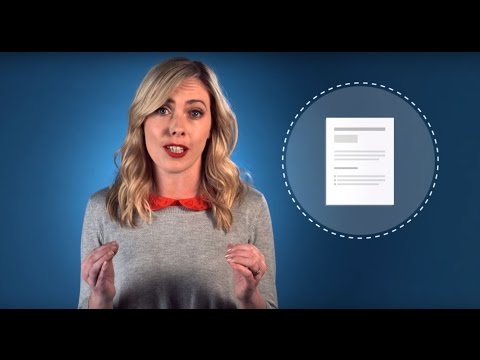To make your CV stand out from the crowd, you need to understand the skills that employers are looking for. Knowing the key skills for a CV will help your application make its way to the top of the pile. It'll help employers see exactly how you'll fit into their organisation.
How to highlight your skills on a CV
Before we examine the list of key skills for your CV, you need to know how to present them.
Anyone can say they have great leadership skills and are self-motivated workers. But how do you evidence that? You need to provide measurable examples, not just for career achievements, but also for CV key skills.
With technical skills, be very specific about your proficiency level. It's not enough to say 'experience with Microsoft Office'. Break it down and list your level of expertise for each component and any relevant training that you have completed.
Your CV needs to be a dynamic document that you can adapt when applying for different roles. Your personal statement is your chance to show why you're the right person for this particular role. Do that by showcasing key skills that match what the employer is looking for.
Now you're ready to learn what to put for key skills in a CV.
What are the key skills for a CV?
You should list three types of skills on your CV. Depending on the job, vary the ones you highlight. The three categories are:
- Transferable skills
- Job-related skills
- Adaptive skills
Transferable skills include leadership and organisation skills. They transfer from one type of business to another.
Job-related skills are more technical. For example, you may give details of specific pieces of machinery or computer programs that you are skilled in using.
Finally, adaptive skills are the everyday soft skills that you need to work successfully both on your own and with others. These include teamwork, self-motivation, and problem-solving.
Bland, generic statements and clichés have no place on good CVs. As we explore the skills to use for a CV, notice how you can provide specific examples to back them up.
Transferable skills
If you have strong transferable skills, you're not tied down to one particular industry. Here are the top four transferable skills to highlight on your CV:
1. Foreign languages
The ability to speak a foreign language can make you a huge asset to a company. If you can read and write fluently in the language as well, even better. But foreign language skills alone are not enough to make you stand out.
A survey of EU nations featured in a report by the House of Lords noted that foreign language skills provide a competitive advantage. But this is only when they form part of a broader set of useful skills. It's important to highlight on your CV how you have used your foreign language skills to give your employer a competitive edge.
The UK lags behind other nations in terms of foreign language ability. EU business leaders highlighted German, French and Russian as the three most important languages other than English. In the post-Brexit world, Indian languages, Portuguese and Mandarin Chinese language skills may also give you an edge.
2. Leadership skills
Every organisation needs leaders to move the workforce forward toward a common goal. Adapt the way you describe your leadership skills to match the role you're applying for. But always use measurable examples to back them up.
This can be hard to do and you might find it useful to get an outsider's perspective. Consider asking a colleague to list your strengths as a leader. Remember, leadership encompasses a number of skills, including:
- Communication
- Motivation
- Delegation
- Conflict resolution
Breaking leadership down into these, and other, parts can help you think of specific examples to cite.
3. Problem solving
Problem solvers are highly sought after by employers. They are able to see a way around barriers and roadblocks to progress and they don't give up. It also includes many facets, such as:
- Analytical skills
- Creativity
- Critical thinking skills
- Collaboration
To provide an example, state the problem as simply as you can and briefly relate the skills you used to solve it. Give specifics in percentage terms, revenue growth or time/money saved. This takes your skills from notional to credible.
4. Time management skills
Time is money. By highlighting your time management skills, you show your potential employer that you understand that.
If you are self-motivated and well organised, you get through your work more quickly. That can even allow employers to move deadlines forward and take on additional projects.
Again, break time management down into its components and give specific examples. Highlight the impact it had on the company's profitability or how much time was saved through your time management skills.
Job-related skills
Job-related skills will vary widely depending on the industry you work in. Here are a few, along with examples of how to really make them sing on your CV:
5. Technical knowledge and skills
When applying for technical roles, make it very easy for the recruiter to see that you are fully qualified and proficient. Do this by listing your skills, relevant qualifications, and a brief summary of your experience.
Making this clear from the outset will allow them to start analysing your transferable and adaptive skills to see if you'd be a good fit for the company.
6. Professional qualifications and experience
If you're applying for a role as a surveyor for example, the first thing the employer wants to know is if you are qualified for the role. If you are still studying for a professional qualification, make it clear when you will finish and your projected grade, if applicable.
When reviewing your CV before applying for a new role, think about the experience that is most relevant. Other roles that are less relevant can be condensed to a line or two.
7. Marketing skills
All companies need marketers. Marketing has changed considerably in the recent past. The latest research shows that many marketers are not keeping up with key digital skills.
Your CV is your chance to showcase your familiarity with the latest tools and trends along with specific examples of their impact. For example, did you launch a social media marketing campaign that netted your company X number of new followers on social media platforms?
Or did you see an increase in profitability or sales following a marketing campaign you led? Specific examples can show that you have both the technical and transferable skills to make a difference to your new employer.
Adaptive skills
Also known as soft skills, these are harder to learn than technical skills. They often reflect our personalities, but we can work on them and refine them. Here are the top three to highlight:
8. Collaborative working skills
Often called teamwork skills in the past, employers need to know that you can work well with and bring the best out of your colleagues. This includes:
- Communication skills
- Conflict resolution
- Active listening
- Empathy
Reflect on these areas and find examples from your work experience to match them. But don't make the explanation too long. Succinctly summarise how your collaborative working skills helped your team to achieve its goals.
Be prepared to expand on this if you're called in for an interview.
9. Innovation skills
It's useful for teams to have an innovator - someone who can think outside the box and come up with creative ideas. This is closely linked with problem-solving and you may be able to combine the two into a single example.
Innovators can come up with ideas that can:
- Improve processes
- Increase productivity
- Simplify workflows.
Can you think of an example when an idea you've had has contributed in one of these ways?
Highlighting your innovation skills tells your prospective employer that you're a proactive worker. You're not just there to go through the motions. You understand the bigger picture and are committed to helping the company achieve its goals.
10. Open to learning new skills
This is one of the key skills to list in a CV. You need to show that you're up for learning new things, are coachable, and motivated to excel.
Think back over your work experience and focus on a time you went out of your comfort zone. Maybe you took on additional qualifications or recognised you needed to improve certain soft skills. But don't fall into the trap of just singing your own praises.
Highlight how learning these new skills benefited the company, along with specific examples.
The key skills for your CV
We all want our CVs to stand out from the crowd and help us get the job we want.
Highlighting these key skills for your CV will help you to do that. Think about the three categories above and always find a measurable example to include. Adapt your CV according to the employer's needs.
At Randstad, we're here to help you find the right job for you. From CV support and careers advice to applying for jobs, we've got everything you need for a successful job hunt.
For more advice on how to write a CV, watch our informational video below.
To put your CV to the test, apply for the latest jobs here or submit your CV to us.




